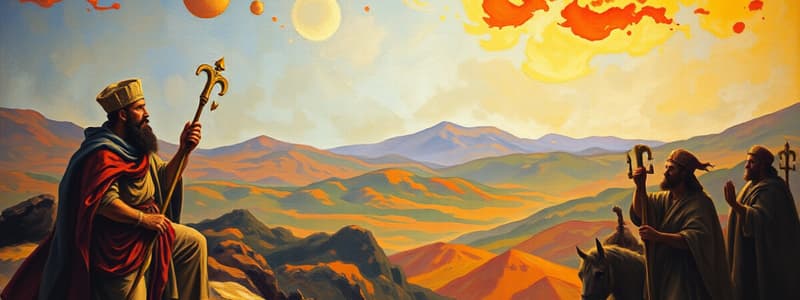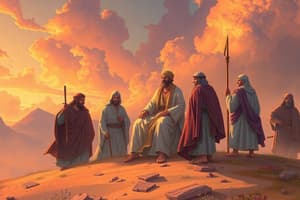Podcast
Questions and Answers
What significant event marked the division of the kingdom after Solomon's reign?
What significant event marked the division of the kingdom after Solomon's reign?
- Elijah's confrontation with Baal
- The rise of Ahab as king
- The split between Israel and Judah (correct)
- The Babylonian exile
Which king of Judah is noted for implementing significant religious reforms?
Which king of Judah is noted for implementing significant religious reforms?
- Jehu
- Ahab
- Hezekiah (correct)
- Jeroboam II
What was one of Elijah's notable miracles that demonstrated God's power?
What was one of Elijah's notable miracles that demonstrated God's power?
- Healing Naaman's leprosy
- Raising the widow's son (correct)
- Purification of poisoned stew
- Multiplying loaves
Which prophet is known for delivering messages of judgment and hope to Israel?
Which prophet is known for delivering messages of judgment and hope to Israel?
What theme is central to the messages conveyed by the prophets during this period?
What theme is central to the messages conveyed by the prophets during this period?
Which kingdom ultimately fell to Assyria in 722 BCE?
Which kingdom ultimately fell to Assyria in 722 BCE?
What strategy did the kings of Israel often resort to when facing threats from neighboring nations?
What strategy did the kings of Israel often resort to when facing threats from neighboring nations?
Which miracle performed by Elisha involved a healing act?
Which miracle performed by Elisha involved a healing act?
Flashcards are hidden until you start studying
Study Notes
Historical Context
- Time Period: Covers the history of Israel and Judah from the death of King David to the Babylonian exile (approximately 850-586 BCE).
- Division of the Kingdom: Follows the split between the northern kingdom of Israel and the southern kingdom of Judah after Solomon's reign.
- Political Context: Features conflicts with neighboring nations (e.g., Assyria and Babylon) and internal strife within the kingdoms.
- Literary Context: Part of the Deuteronomistic history, emphasizing obedience to God and the consequences of idolatry.
Key Characters
- Elijah: A prophet who confronts King Ahab and challenges Baal worship.
- Elisha: Successor of Elijah; performs miracles and continues prophetic ministry.
- Kings of Israel: Includes Ahab, Jehu, and Jeroboam II, known for their varying degrees of faithfulness to God.
- Kings of Judah: Includes Hezekiah and Josiah, recognized for their reforms and attempts to restore true worship.
- Prophets: Various prophets, including Amos and Hosea (Israel) and Isaiah (Judah), who provide messages of judgment and hope.
Miracles And Signs
- Elijah's Miracles:
- The contest on Mount Carmel (fire from heaven).
- Raising the widow's son.
- Elisha's Miracles:
- Purification of poisoned stew.
- Multiplication of loaves and healing Naaman's leprosy.
- Signs: Used to validate the prophets’ authority and God's power over nature and foreign gods.
Themes Of Prophecy
- Judgment and Hope: Prophecies often include warnings of impending judgment due to sin, but also messages of hope and restoration.
- Covenant Faithfulness: Emphasizes the importance of remaining faithful to God’s covenant, leading to blessings or curses.
- Role of Prophets: Prophets serve as intermediaries, conveying God’s will and guiding the kings and people.
Kingdoms Of Israel And Judah
- Israel (Northern Kingdom):
- Capital: Samaria.
- Notable for its idolatry and conflict with prophets.
- Ultimately falls to Assyria in 722 BCE.
- Judah (Southern Kingdom):
- Capital: Jerusalem.
- More faithfully adheres to the worship of Yahweh, especially under good kings like Hezekiah and Josiah.
- Falls to Babylon in 586 BCE, leading to exile.
- Inter-Kingdom Relationships: Frequent alliances and conflicts between Israel and Judah, affecting their political and spiritual landscapes.
Historical Context
- Time period spans from the death of King David to the Babylonian exile, approximately 850-586 BCE.
- Kingdom of Israel splits into the northern kingdom (Israel) and the southern kingdom (Judah) after Solomon's reign.
- Political landscape marked by conflicts with Assyria and Babylon, alongside internal strife within both kingdoms.
- Part of the Deuteronomistic history, highlighting obedience to God and the repercussions of idolatry.
Key Characters
- Elijah: A prophet known for challenging King Ahab and opposing Baal worship.
- Elisha: Successor to Elijah who performs miracles and continues the prophetic mission.
- Kings of Israel include Ahab, known for his idolatry, and Jeroboam II, noted for varied faithfulness.
- Kings of Judah feature Hezekiah and Josiah, celebrated for their religious reforms and efforts to restore true worship.
- Prophets like Amos and Hosea deliver messages of both judgment and hope for Israel, while Isaiah offers similar insights for Judah.
Miracles And Signs
- Elijah's miracles include the contest at Mount Carmel, where he calls down fire from heaven, and the raising of a widow's son.
- Elisha's miracles consist of purifying poisoned stew, multiplying loaves, and healing Naaman’s leprosy.
- Miracles serve to validate the prophets' authority and demonstrate God's supremacy over nature and foreign deities.
Themes Of Prophecy
- Prophecies convey a dual message of impending judgment for sin and hope for future restoration.
- Emphasis on covenant faithfulness illustrates the consequences of obedience and disobedience to God's commands.
- Prophets act as intermediaries, delivering God's guidance and will to the kings and the people.
Kingdoms Of Israel And Judah
- Northern Kingdom (Israel) has its capital in Samaria, known for widespread idolatry and conflict with prophetic voices.
- Israel falls to Assyria in 722 BCE, resulting in the end of the northern kingdom.
- Southern Kingdom (Judah) has Jerusalem as its capital, more consistent in Yahweh worship under kings like Hezekiah and Josiah.
- Judah is conquered by Babylon in 586 BCE, leading to the exile of its people.
- Israel and Judah frequently engage in alliances and conflicts that shape their political and spiritual dynamics.
Studying That Suits You
Use AI to generate personalized quizzes and flashcards to suit your learning preferences.




